Related Research Articles

Ragtime, also spelled rag-time or rag time, is a musical style that had its peak from the 1890s to 1910s. Its cardinal trait is its syncopated or "ragged" rhythm. Ragtime was popularized during the early 20th century by composers such as Scott Joplin, James Scott, and Joseph Lamb. Ragtime pieces are typically composed for and performed on piano, though the genre has been adapted for a variety of instruments and styles.

Scott Joplin was an American composer and pianist. Dubbed the "King of Ragtime", he composed more than 40 ragtime pieces, one ragtime ballet, and two operas. One of his first and most popular pieces, the "Maple Leaf Rag", became the genre's first and most influential hit, later being recognized as the quintessential rag. Joplin considered ragtime to be a form of classical music meant to be played in concert halls and largely disdained the performance of ragtime as honky tonk music most common in saloons.

James Hubert "Eubie" Blake was an American pianist and composer of ragtime, jazz, and popular music. In 1921, he and his long-time collaborator Noble Sissle wrote Shuffle Along, one of the first Broadway musicals written and directed by African Americans. Blake's compositions included such hits as "Bandana Days", "Charleston Rag", "Love Will Find a Way", "Memories of You" and "I'm Just Wild About Harry". The 1978 Broadway musical Eubie! showcased his works, and in 1981, President Ronald Reagan awarded Blake the Presidential Medal of Freedom.

Benjamin Robertson Harney was an American songwriter, entertainer, and pioneer of ragtime music. His 1896 composition "You've Been a Good Old Wagon but You Done Broke Down" is the second ragtime composition to be published and the first ragtime hit to reach the mainstream. The first Ragtime composition published was La Pas Ma La written by Ernest Hogan in 1895. It has been disputed by many historians on whether or not, "You've Been a Good Old Wagon but You Done Broke Down" was released in late 1895 or early 1896. On the front cover of "You've Been a Good Old Wagon but You Done Broke Down", it is listed as being copyrighted on 1895. However, on the first page, it is listed as being copyrighted in 1896. During the early years of Harney's career, he falsely promoted himself as being the inventor of ragtime and never acknowledged the genre's black origin. Many contemporary musicians criticized him for it. Although ragtime is now probably more associated with Scott Joplin, in 1924 The New York Times wrote that Ben Harney "Probably did more to popularize ragtime than any other person." Time magazine called him "Ragtime's Father" in 1938.
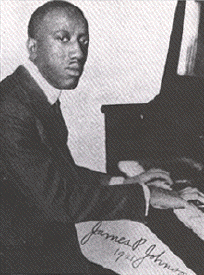
James Price Johnson was an American pianist and composer. A pioneer of stride piano, he was one of the most important pianists in the early era of recording, and like Jelly Roll Morton, one of the key figures in the evolution of ragtime into what was eventually called jazz. Johnson was a major influence on Count Basie, Duke Ellington, Art Tatum, Thelonious Monk, and Fats Waller, who was his student.

Charles Luckyth Roberts, better known as Luckey Roberts, was an American composer and stride pianist who worked in the jazz, ragtime, and blues styles. Roberts performed as musician, band/orchestra conductor, and dancer. He taught music and dance. He also owned a restaurant and bar in New York City and in Washington, D.C. Luckey Roberts noted compositions include "Junk Man Rag", "Moonlight Cocktail", "Pork and Beans" (1913), and "Railroad Blues".
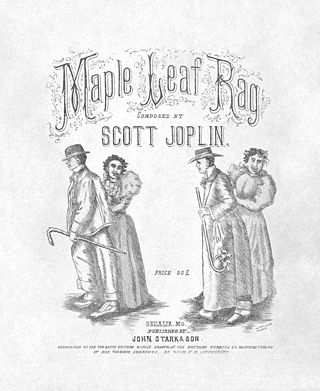
The "Maple Leaf Rag" is an early ragtime musical composition for piano composed by Scott Joplin. It was one of Joplin's early works, becoming the model for ragtime compositions by subsequent composers. It is one of the most famous of all ragtime pieces. Its success led to Joplin being dubbed the "King of Ragtime" by his contemporaries. The piece gave Joplin a steady if unspectacular income for the rest of his life.
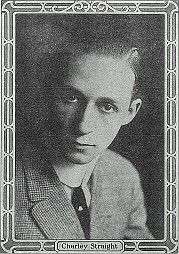
Charles Theodore "Charley" Straight was an American pianist, bandleader and composer.

"The Entertainer" is a 1902 classic piano rag written by Scott Joplin.

Novelty piano is a genre of piano and novelty music that was popular during the 1920s. A successor to ragtime and an outgrowth of the piano roll music of the 1910s, it can be considered a pianistic cousin of jazz, which appeared around the same time. "Nola," a 1915 composition by New York pianist Felix Arndt, is generally considered the first novelty piano hit. Many early novelty composers were piano roll artists from the Chicago area, where two of the largest piano roll companies, QRS and Imperial, were based. While often only lightly syncopated or lacking syncopation entirely, novelty piano influenced the evolution of jazz. It is distinct from stride piano, which was developed in New York at about the same time.
John Sheppard Maddox Jr. was an American ragtime pianist, historian, and collector of music memorabilia.
Reginald R. Robinson is an American jazz and ragtime pianist. In 2004, he received a MacArthur Genius Grant.
Thomas William Shea was an American ragtime composer.
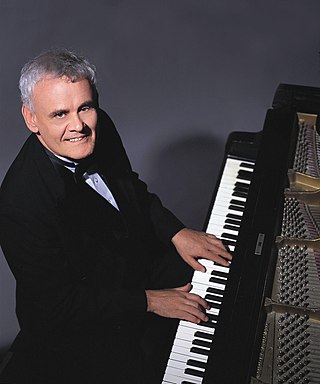
Terry Waldo is an American pianist, composer, and historian of early jazz, blues, and stride music, and is best known for his contribution to ragtime and his role in reviving interest in this form, starting in the 1970s. Says Wynton Marsalis in his introduction to Waldo's book: "He teaches Ragtime, he talks about Ragtime, he plays it, he embodies it, he lives it, and he keeps Ragtime alive." The book, This is Ragtime, published in 1976, grew out of the series of the same title that Waldo produced for NPR in 1974. Waldo is also a theatrical music director, producer, vocalist, and teacher. He is noted for his wit and humor in performance, as "a monologist in the dry, Middle Western tradition." Eubie Blake describes his first impression of Waldo's performance thus: "I died laughing...that's one of the hardest things to do—make people laugh. Terry's ability to do this, combined with his musicianship, actually reminds me of Fats Waller."
Elite Syncopations is a one-act ballet created in 1974 by Kenneth MacMillan for The Royal Ballet.
Donald Ashwander (1929–1994) was an American composer in the contemporary ragtime movement. Much of his printed music was not available to the general public until 1996, two years after his death.
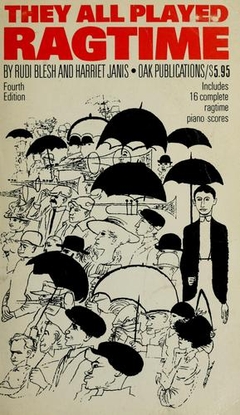
They All Played Ragtime is a non-fiction book by journalist Rudi Blesh and author Harriet Janis, originally published by Grove Press in 1950. It was subsequently reissued in 1959, 1966, and 1971 by Oak Publications, and in 2007 by Nelson Press. According to the Preface to the Fourth Edition, by Rudi Blesh, the book was conceived and researched largely by Harriet Janis, who died in 1963. It is generally recognized as the pioneering and first serious book to document the history and major composers of ragtime in America, and has been referred to as The Bible of Ragtime.
Glenn Jenks was an American ragtime pianist, composer and music historian.
Axel Waldemar Christensen was an American composer, arranger, publisher, pianist and music instructor. He was the founder of the Christensen School of Popular Music, under which he published various instruction books about the playing of syncopated music. The school enrolled upwards of 500,000 students in its numerous branches across the United States, making it one of the first and most successful examples of standardizing the instruction of popular music. The school also published the music magazine 'Christensen Ragtime Review'. His formal attire and preference for grand pianos gave him the vaudeville title 'Czar of Ragtime'.
References
- 1 2 3 4 5 6 Black, Noel (March 2, 2016). "Max "Mr. Ragtime" Morath to be Inducted into Colorado Music Hall of Fame". KRCC. Archived from the original on September 25, 2016. Retrieved September 24, 2016.
- 1 2 3 4 5 6 7 8 9 Al Campbell (October 1, 1926). "Max Morath | Biography". AllMusic . Archived from the original on October 13, 2016. Retrieved January 27, 2014.
- 1 2 3 4 5 6 7 Wilson, John S. (July 30, 1982). "Max Morath in Rag and 'Unragtime'". The New York Times . Archived from the original on September 25, 2016. Retrieved September 24, 2016.
- 1 2 McFadden, Robert D. (June 19, 2023). "Max Morath, Pianist Who Staged a One-Man Ragtime Revival, Dies at 96". The New York Times. Retrieved June 19, 2023.
- 1 2 3 4 5 6 Oleg Mezjuev (1996). "Max Morath". Ragtime.nu. Archived from the original on August 8, 2011. Retrieved August 9, 2011.
- ↑ Brown, G. (July 16, 2018). "Max Morath". Colomusic.org.
- ↑ Morath, Max. "Ragtime Then and Now". In The Oxford Companion to Jazz, Bill Kirchner, ed. Oxford University Press, 2000, pp. 29–38.
- ↑ "Record Reviews: Popular". Stereo Review. 29: 90. November 1972.
- ↑ Morath, Max (2008). I love you truly : a biographical novel based on the life of Carrie Jacobs-Bond. New York: iUniverse. ISBN 978-0595530175.
- ↑ Morath, Max; Skomars, Diane Fay; Schoenstein, Ralph (1999). Max Morath : The Road to Ragtime. Virginia Beach, VA: Donning Company/Publishers. ISBN 1578640687.
- ↑ Morath, Max (February 5, 2002). The NPR Curious Listener's Guide to Popular Standards by Max Morath. Penguin Books. ISBN 9781101203118 . Retrieved June 21, 2023.
- ↑ "Blind Boone: The Screenplay". Archived from the original on May 19, 2015. Retrieved June 2, 2015.
- ↑ "Max Morath: A Personal View". The Syncopated Times. February 28, 2022.
- ↑ Wilson, John S. (July 30, 1982). "MAX MORATH IN RAG AND 'UNRAGTIME'". The New York Times .
- ↑ "New Recordings". E B Marks. 2015. Archived from the original on October 1, 2015. Retrieved November 1, 2015.
- ↑ "Records that changed Ragtime History" in Interview with Matthew de Lacey Davidson, "The Syncopated Times: Artist Profiles" Archived December 30, 2022, at the Wayback Machine . Published online, September 30, 2021.
- ↑ Gabler, Jay (June 19, 2023). "Duluth's Max Morath, ragtime legend and public TV pioneer, dead at 96". Duluth News Tribune . Retrieved June 19, 2023.
- ↑ McFadden, Robert D. (June 19, 2023). "Max Morath, Pianist Who Staged a One-Man Ragtime Revival, Dies at 96". The New York Times . Retrieved June 20, 2023.
- ↑ "Max Morath". Archived from the original on January 29, 2023. Retrieved June 19, 2023.
- ↑ Melton, Larry (September 29, 2022). "Glenn Jenks Ragtime Revue Scheduled for Oct. 23". The Syncopated Times. Archived from the original on March 24, 2023. Retrieved May 20, 2023.
- ↑ Gabler, Jay (December 26, 2022). "'Mr. Ragtime' Max Morath, public TV pioneer, is happily living his coda in Duluth". The Duluth Times. Duluth, Minnesota. Archived from the original on February 7, 2023. Retrieved May 20, 2023.
- ↑ "Max Morath | Discography". AllMusic . Retrieved January 27, 2014.